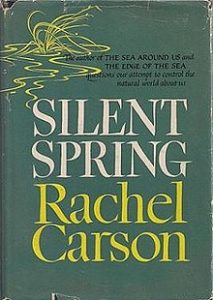 Today is Rachel Carson's birthday! Rachel Carson (May 27, 1904 - April 14, 1964) was an extraordinary and courageous person, who is best known for exposing the harms of long-lasting pesticides. She was a marine biologist and author, who published several best-selling books about the environment.
Today is Rachel Carson's birthday! Rachel Carson (May 27, 1904 - April 14, 1964) was an extraordinary and courageous person, who is best known for exposing the harms of long-lasting pesticides. She was a marine biologist and author, who published several best-selling books about the environment.
Rachel Carson discussed health and environmental harms that synthetic pesticides, especially DDT, were causing to wildlife and our environment in the widely read book Silent Spring (published in 1962). Chemical companies fiercely opposed the book, but it spurred the American people to finally take action on pesticides. It led to a nationwide ban on DDT and other long-lasting pesticides, as well as helping inspire a grassroots environmental movement that led to the creation of the United States Environmental Protection Agency (EPA).
After her death, President Jimmy Carter awarded her the Presidential Medal of Freedom. (More about Rachel Carson) To this day, the book Silent Spring is considered an environmental classic, and one of the most significant publications of the last century.
One tribute to her work is the Silent Spring Institute, a national environmental health research organization dedicated to uncovering the links between chemicals in our everyday environment and women's health. Another focus is on breast cancer prevention (by lowering exposure to harmful chemicals, as well as encouraging companies to develop safer products). (Yes, Rachel Carson died of breast cancer.)
Some quotes from Rachel Carson. They still apply decades later:
"A Who's Who of pesticides is therefore of concern to us all. If we are going to live so intimately with these chemicals eating and drinking them, taking them into the very marrow of our bones - we had better know something about their nature and their power.”
"It is also an era dominated by industry, in which the right to make a dollar at whatever cost is seldom challenged."
"These sprays, dusts, and aerosols are now applied almost universally to farms, gardens, forests, and homes - nonselective chemicals that have the power to kill every insect, the 'good' and the 'bad,' to still the song of birds and the leaping of fish in the streams, to coat the leaves with a deadly film, and to linger on in soil-all this though the intended target may be only a few weeds or insects. Can anyone believe it is possible to lay down such a barrage of poisons on the surface of the earth without making it unfit for all life? They should not be called 'insecticides,' but 'biocides.' (Silent Spring, 1962)
